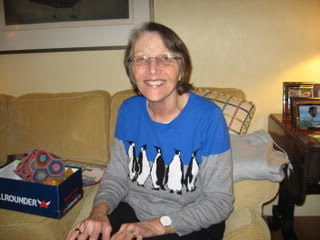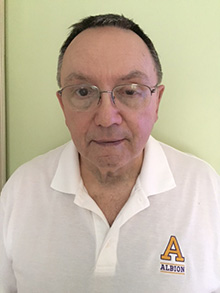They Heard MLK’s ‘I Have a Dream’ in Person. It Changed Them for Life
Related Posts
Connect With Us
Rosemary Smith Zander and Denny Kime, Albion College seniors in August 1963, revisit their participation in the March on Washington
January 24, 2017
By Chuck Carlson
“I have a dream that one day this nation will rise up and live out the true meaning of its creed: ‘We hold these truths to be self-evident: that all men are created equal.’
I have a dream that one day on the red hills of Georgia the sons of former slaves and the sons of former slave owners will be able to sit down together at the table of brotherhood.
I have a dream that one day even the state of Mississippi, a state sweltering with the heat of injustice, sweltering with the heat of oppression, will be transformed into an oasis of freedom and justice.
I have a dream that my four little children will one day live in a nation where they will not be judged by the color of their skin but by the content of their character.
I have a dream today.”
On the sweltering afternoon of August 28, 1963, civil rights leader Martin Luther King, Jr. delivered what came to be known as his “I Have a Dream” speech on the steps of the Lincoln Memorial.
King, already a towering figure in America’s growing civil rights movement, was one of many speakers at the March on Washington for Jobs and Freedom that day, a rally that drew an estimated 250,000 people.
The crowd included black and white, rich and middle class and poor, the curious and the true believers. For many Americans who watched on TV, it was the first shout of protest about the inequities in American society.
The crowd also featured two Albion College students—one from the shadow of New York City and the other from small-town Michigan. They went to the rally in Washington, D.C., for different reasons, but each departed profoundly changed by King’s speech.
Denny Kime and Rosemary Smith (now Zander) were both from the class of 1964, and though neither knew each other in their time at Albion, they were, and still are, connected because of that speech, which to many Americans remains one of the seminal speeches in U.S. history.
Each remembers the speech as well as little details about what happened that special summer day in D.C.
And each knew that this was no ordinary speech. Each knew this would be a clarion call, an appeal, perhaps a plea, for their America to be the kind of country they always hoped it could be.
These are their stories about a speech given more than 53 years ago in a different time and a different place in America. But to Zander and Kime, it is as fresh and memorable as if it were given yesterday.
Rosemary Smith Zander: ‘A Powerful Experience’

Rosemary Smith Zander, ’64, first arrived at Albion with plans for a music career before becoming a sociology and religion major, her first steps toward a career in psychiatric social work.
For Rosemary Smith, the issue of civil rights was personal. She recalled when her older sister was attending Earlham College in Indiana and the school’s president called her parents.
“He asked them if they’d give permission for her to room with a black student,” she said. “This was only two years before I started at Albion and I thought, ‘That’s where we are on civil rights.’ It was certainly an issue with which I was aware.”
Raised in a Methodist home in Rahway, N.J., Smith was well schooled in the church’s concept of giving back to others. So in the summer of 1963, between her junior and senior year at Albion, she went with other college students to Nashville, Tenn., to help register blacks to vote.
“Clearly we were out to re-elect President Kennedy in ’64,” she said. “It was obviously more than that because we wanted to get people registered. We were registering door to door and a lot of it in low-income housing.”
Before long, Nashville police showed up and told the group of 15 students to stop. When they refused, the students, including Smith, were arrested and charged with disorderly conduct.
“This was the height of the civil rights turmoil, so the cops had been very aware of our presence,” Zander said. “We were put in individual cells and, frankly, I was scared out of my mind. We all were.”
The leaders of the group raised bail and, eventually, the charges were dropped. Soon after, the group went to D.C. for the rally, returning to Nashville afterward to continue their registration work.
“We went up [to D.C.] by the busload,” Zander said. “We had no place to stay.”
Once in Washington, Zander was amazed by the size and diversity of the people who crowded into the Mall area.
“I certainly knew of [King’s] work but I had not heard him in person,” she said, anticipating this was an event not to be missed. “But I knew this was going to matter and there was no question this was going to matter.”
Then King began to speak.
“What he could do with cadence and pitch and timbre,” she said. “He was a speaker. It was a message that this was a dream for my children. He was talking as a person to people. There was a feeling in the crowd; he had them eating out of his hand. It was a hot, humid day and that crowd was with him on every word. Your body moved in the rhythm of what he was saying.”
Zander took his words back to school with her.
The sociology and religion major, who had come to Albion originally with plans for a music career, had been changed.
A member of a sorority since her freshman year, she quit once she returned for the fall semester.
“I couldn’t be in a group that didn’t accept black students,” she said.
She also became all too conscious of the lack of diversity on campus.
“There was only one black person I knew of in my class and that was in four years,” she said. “There was very little diversity in our class.”
As well, her honors thesis would be on the subject of the Methodist religion and race relations.
After graduating from Albion, she took a year off and worked as a house parent for low-income kids who had been placed in government housing. Then she earned her master’s in social work from Simmons College in Boston.
She then began her career in psychiatry and social work, spending most of her time as the chief psychiatric social worker at what was then the Bergen Pines County Hospital in Paramus, N.J.
And to this day, King’s speech has stayed with her.
“That was a powerful experience,” she said.
Denny Kime: The Job Isn’t Done

“We got about a third of the way up the steps [of the Lincoln Memorial],” Denny Kime recalls of the spot where he and two friends heard King speak. “People in the crowd had their heads bowed. They were singing quietly to themselves. … We got the notion that this was a big deal, but we didn’t have any means to know just how big a deal it was.”
“My high school friend Tom said, ‘Hey Kime, Jim (another friend) and I going to Washington, D.C. You want to come along?” Kime recalled with a laugh. “I had no idea what he was talking about. But I was intrigued to go to the nation’s capital, so I said, ‘What’s it about?’” And he said, ‘There’s a civil rights march in Washington and I want to go. I don’t want to go alone.’”
So Denny Kime, who admitted he hadn’t thought much on the issue of civil rights before, decided to join his friends on the trip.
He grew up in Niles and had come to Albion to play football, study biology and psychology, and eventually become a doctor as his mother had wished.
But during the 13-hour drive from Albion to Washington, the friends began to talk about civil rights and Kime began to change.
“We talked about this stuff on the drive,” he said. “My education came on the road as we headed for the march. We examined our growing up.”
And they realized that while they had grown up in a relatively diverse area, they had not socialized with people of color.
“For example, they didn’t come to our dances and we didn’t go to theirs,” he said. “After-school activities were pretty much white or not. We didn’t really see that until we began to talk about it on the drive. Then it came into focus.”
Once in D.C., the group managed to find something to eat and, when their plans to have an early-morning picnic on the Washington Monument grounds were thwarted by a National Park Service ranger, the ranger let them eat in his basement office.
“We talked about the march and he said they were expecting a lot of people,” Kime said.
After that they spread out their sleeping bags and slept in the backyard of a nearby home.
“Nobody bothered us,” he said. “But when we saw the face of the woman who lived in the home pressed against the back window in the morning, we figured we would leave.”
Kime admits he knew little about Martin Luther King, Jr., but that changed rapidly as they reached the rally site.
“There was singing and people were carrying signs and there were church choirs,” he said. “There were lots of police and military but they were just standing quietly.”
Eventually, Kime and his friends worked their way to the Reflecting Pool, and then to the steps of the Lincoln Memorial.
“We got about a third of the way up the steps,” he said. “That wasn’t by design because we still didn’t know what we were doing.”
Eventually, King stood up and made the speech everyone had come to hear.
“I recall watching the crowd,” Kime said. “People in the crowd had their heads bowed. They were singing quietly to themselves. They were saying ‘Amen’ and there were tears. People were hugging each other, standing arm in arm. We got the notion that this was a big deal, but we didn’t have any means to know just how big a deal it was. That’s still a surprise to me. Here we are 50 years later and people are still talking about it being one of the most important moments in civil rights.”
The impact of that speech stayed with Kime and his friends.
“The experience had changed me,” he said. “I had a greater awareness of the subtleties of race.”
He began to think of little things, including how a cashier would look a white customer in the face but wouldn’t do the same for a black customer.
“All of a sudden I’m aware of that,” Kime said. “I tried to change my behavior because I was guilty of it and I wasn’t aware of it. After that, I always made an effort to touch a person’s hand. Just subtle things.”
Though scheduled to graduate in spring 1964, Kime was short of credits. In January 1965, he was drafted, joined the Marines and was sent to Vietnam.
In Vietnam barely two months, Kime stepped on a mine while on patrol in Da Nang and suffered second- and third-degree burns on his neck, face and eyes as well as ruptured ear drums. He underwent three months of rehabilitation and was eventually deemed medically unfit to serve and discharged.
He returned to Albion College, but knew quickly it was a mistake.
“I wasn’t ready to come back,” he said. “My head was all scrambled. I was invited to leave.”
He instead became a full-time substitute teacher in Eau Claire, Mich., teaching chemistry and biology. When state requirements changed and demanded he have education credits, Kime was once again readmitted to Albion. This time he flourished.
“So I was actually the graduating class of 1971,” he said with a laugh. “I was a member of the class of 1964, ’65, ’67 and ‘71. I think I hold the record, and if I don’t I’m in the top five.”
He went back to Eau Claire, teaching biology and psychology for 29 years as well as serving as softball and assistant football coach.
For him, the King speech was indeed a turning point in more ways than he could have imagined.
“Back in the ’60s I never thought there would be a black president,” he said. “I thought Jim Crow laws would go away, but I never thought there would be a black president. I understand what Martin Luther King was saying that day. This wasn’t a stopping point but part of a continuing movement. In 50 years you can see a lot of change, but it’s not done yet.”

Albion College and the Albion Branch of the NAACP will host the Rev. Dr. Martin Luther King, Jr. Convocation and Community Celebration on Monday, January 30 at 7 p.m. at the Bohm Theatre, 201 S. Superior St. The guest speaker will be Eugene Robinson, Pulitzer Prize-winning columnist of The Washington Post. His talk is titled “We’re Someplace We’ve Never Been: Race, Diversity, and the New America.” The event is free and open to the public.